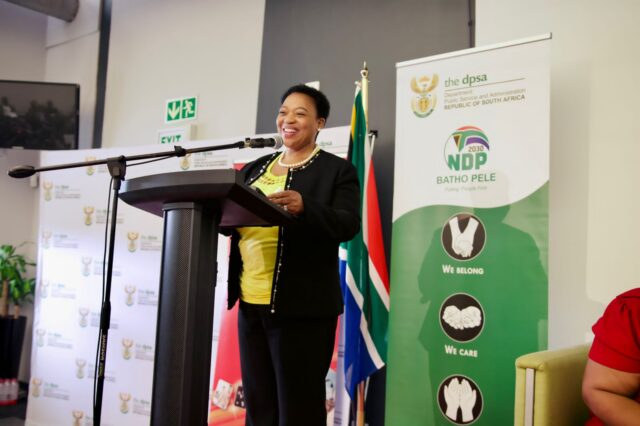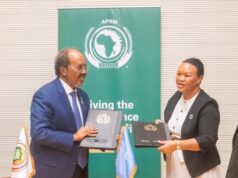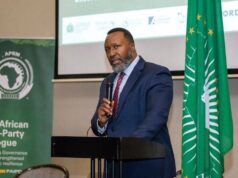South Africa need a good cadre of public servants that are desired in world class economies, says Kwazulu-Natal Premier, Ms Nomusa Dube-Ncube speaking at the he NDP and State Capacity 3-day conference on Monday in Durban.
“We need to have a good cadre of public service that is desired in Singapore and other world-class economies that is proud to work for the state.
“A functional and integrated government requires a professional, responsive and meritocratic public service cadre that is obsessed with efficiency and citizen-focused delivery.
“To be able to lead a state that is capable of playing a developmental and transformative role, this public service must be immersed in the development agenda but must be insulated from undue political interference.
“These factors must interact together in one direction to achieve the National Development Plan (NDP) goals, and to lead the thorough-going transformation of our country at all levels. In addressing this challenge in KwaZulu-Natal, at least 100% of municipal officials have been audited for skills,” she
“The fact remains that we will not be able to achieve the ideals of the NDP without all the relevant parties working together towards one single plan for the country.
“The NDP committed all stakeholders at national, provincial and municipal level to a number of targets to be achieved within an 18-year timeframe. Having travelled 10 of those years, it is appropriate to perform a public assessment of our journey, as we shall do over the next few days,” she said.
Ms Dube-Ncube said the adoption of the NDP in 2012 was a seminal moment in the country’s history, which ushered the nation onto a novel planned developmental pathway by setting for the first time, key steps to follow in order to attain a better future by 2030.
According to her, the first detailed analysis of the “NDP” implementation in KwaZulu-Natal was undertaken in 2011, under the guidance of the newly appointed Provincial Planning Commission.
“This is because our province’s planning model of the Provincial Planning Commission predates the NDP, and the National Planning Commission.
The Provincial Growth and Development Strategy (PGDS) is however now aligned to the national plan and is a macro policy instrument which incorporates the Medium-Term Strategic Framework (MTSF) and government’s five-year programme of action,” she said.
However, she said evidence indicates that more needs to be done to meet the lofty, but justified dreams of the Constitution and the NDP. A similar approach she said was followed in the 2020 review identifying benchmarks as well as key challenges and interventions.
“Implementation of Education Goal- moving towards 4IR one of the key findings of our review was that on a quantitative basis, education and training outputs have improved in KZN over the past 10 years.
The number of people without any schooling decreased from 2011 to 2021 with an average annual rate of 4.91%, while people with ‘matric only’ increased from 1.79 million to 2.59 million. Sadly, those without any schooling in KwaZulu-Natal accounted for 24.40% of the national figure,” she said.
In Kwazulu-Natal, the Premier said there is inadequate focus on emotional well-being and the reskilling of educators lacks attention to the Fourth Industrial Revolution.
“This has resulted in a substantial mismatch between the skills demand and supply axis in our province. This is a matter that has been raised sharply by the private sector as well.
“We are now addressing this vigorously with the project of the SMART province, which will see the roll out of the digital economy and 4IR skills and all its attendant technologies,” she said.
The Premier also announced that there is a positive correlation between growth in tourism and employment creation adding that programmes are now in place, which are paying dividends with new and more airlines flying into King Shaka International Airport.
Capacity at local level
Ms Dube-Ncube said a lack of institutional capacity at a local level has limited the capability of government to provide infrastructure and services in an efficient and corruption free manner.
“The threat of low expenditure in infrastructure low expenditure levels on infrastructure investment is evidence of these capacity deficiencies despite the national government continuously emphasising the need for more investment.
“We have also experienced relatively massive under-funding for decades, and this has led to decay and in some instances, a collapse of key network infrastructure at local, provincial and national level. At this conference, we are confronting the challenge of uneven implementation that arises clearly out of capacity inadequacy across the state manifesting in uneven outcomes at local, provincial and national government.
“We are clear that these skills gaps lead to, and are also a result of weak accountability, persistent corruption emanating from a leadership skills deficit. Such a public service is yet to embrace Information and Communication Technology resulting in missed opportunities and efficiency gains. Building capabilities is key to retooling the State for higher performance,” she said.
Capable and competent public servant
Premier Dube-Ncube said the public service would not be able to deliver higher quality public services to citizens if public servants are not capable and competent.
“Towards building the capacity of the state, the Provincial Executive Council resolved that skills audit be conducted for all public servants in the Provincial Administration including the municipalities, which is more than 200 000 strong. This will assist us to ascertain whether as the KwaZulu-Natal Provincial Administration we have the required skills set to deliver services to our people.
She told the conference aptly themed ‘Reflections on State Capacity and Government Performance through the first ten years of the National Development Plan’ that the exercise is assisting us to know the skills in supply and the skills in demand.









